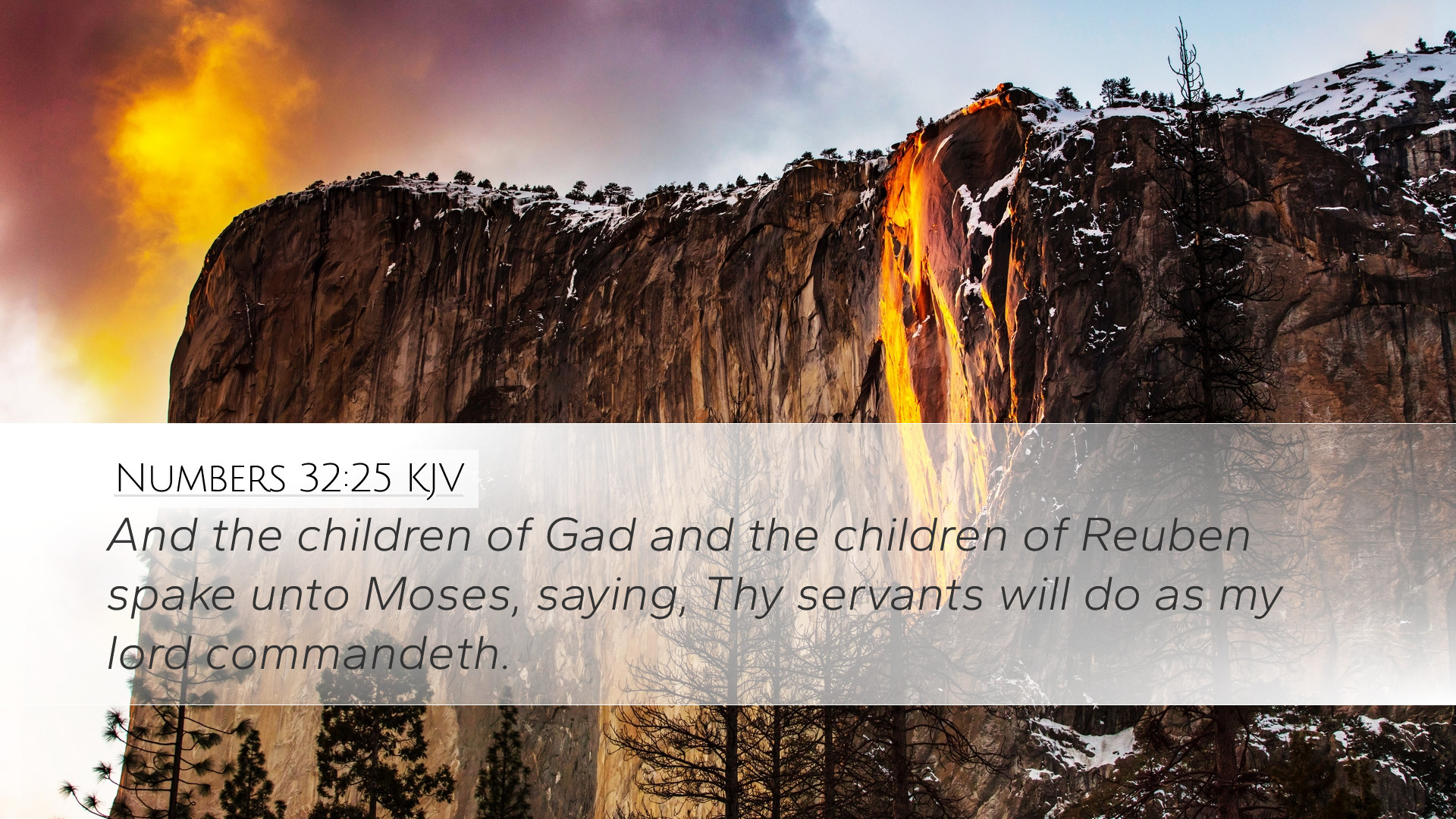Commentary on Numbers 32:25
Verse: "And the children of Gad and the children of Reuben spake unto Moses, saying, Thy servants will do as my lord commandeth."
Introduction
This verse is part of a larger narrative where the tribes of Gad and Reuben express their commitment to assist the Israelite community in their conquests. The context is critical, as it not only shows their willingness to support their brethren but also highlights themes of duty, leadership, and the covenantal responsibilities of God’s people.
Exegesis and Analysis
The request made by the tribes of Gad and Reuben is significant on several levels:
- Commitment to Community: Their statement emphasizes unity and collaboration. They recognize that the journey to reclaim the Promised Land is collective.
- Authority and Leadership: The manner in which they address Moses shows respect for his leadership while seeking to clarify their intentions.
- Theological Implications: This moment illustrates the responsibilities of those who are blessed by the Lord to not only seek personal gain but to fulfill broader community goals.
Matthew Henry's Commentary
Matthew Henry points out that the tribes of Gad and Reuben demonstrate a commendable spirit of servitude. He emphasizes their willingness to cooperate for the greater good, referencing the importance of working collectively towards God’s promises. Henry asserts that this cooperation is a model for Christian unity, noting that individual interests must yield to communal responsibilities in the body of Christ.
Albert Barnes's Insights
Albert Barnes highlights the significance of the location—Gad and Reuben chose to settle east of the Jordan River. He interprets their willingness to battle alongside their brethren as a crucial testament to their faith and loyalty. Barnes underscores that these tribes, although taking land outside of the designated Promised Land, commit to maintaining fellowship by joining their brothers in warfare against the adversaries. This shows the seriousness of their covenant obligations, even when faced with personal and territorial choices.
Adam Clarke's Contributions
Adam Clarke offers a detailed exploration of the verse, focusing on the deeper implications of their promise to Moses. He draws attention to the leadership complexities and moral responsibilities held by those in positions of authority. Clarke interprets the statement as a fulfillment of the ideal of selfless leadership, showcasing how true leaders motivate their communities toward collective achievements while maintaining loyalty to God’s commands.
Theological Themes
This verse encapsulates several key theological themes that resonate throughout scripture:
- Unity in Diversity: The tribes of Gad and Reuben, while having their desires and needs, choose to say yes to a larger mission. This reflects the church's calling to remain united despite differing opinions and preferences.
- Courage in Leadership: Their confrontation with Moses exemplifies the courage required to take a stand for commitments made before God and the community.
- Fulfilling God’s Promises: Commitment to God’s promises involves both personal faithfulness and collective responsibility.
Pastoral Reflections
Pastors and theologians can glean various applications from this verse:
- Encouraging Service: There’s a call to emphasize the importance of serving one another within the church. Encourage your congregations to see themselves as part of a larger body.
- Clarifying Leadership Roles: This passage presents a valuable lesson on the necessity of clarity and respect in leadership and decision-making within the church.
- Fostering Commitment: The commitment made by Gad and Reuben can serve as a model for fostering a culture of commitment to both God and the church.
Conclusion
Numbers 32:25 serves as a beacon of communal strength and commitment in the face of personal choice. The responses of Gad and Reuben remind us that true faith is not only personal but also communal. Their words to Moses resonate throughout history, calling believers to unity, service, and leadership. Such reflections challenge modern readers to examine their roles within their faith communities and to prioritize collective goals consistent with God's mission.


